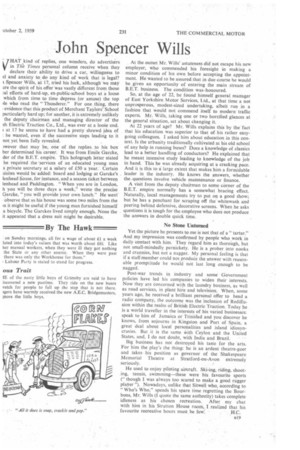John Spencer Wills
Page 53

If you've noticed an error in this article please click here to report it so we can fix it.
VHAT kind of replies, one wonders, do advertisers in The Times personal column receive when they declare their ability to drive a car, willingness to el and anxiety to do any kind of work that is legal? i Spencer Wills, at 17, tried his luck, although we may are the spirit of his offer was vastly different from those :al efforts of hard-up, ex-public-school boys at a loose which from time to time depress (or amuse) the top Ile who read the " Thunderer." For one thing, there evidence that this product of Merchant Taylors' School particularly hard up; for another, it is extremely unlikely the deputy chairman and managing director of the sh Electric Traction Co., Ltd., was ever at a loose end. I at 17 he seems to have had a pretty shrewd idea of : he wanted, even if the successive steps leading to it
not yet been fully revealed. .
)wever that may be, one of the replies, to his box ber determined his career. It was from Emile Gareke, der of the B.E.T. empire, This holograph letter stated he required the 'services of an educated young man s private secretary at a salary of £50 a year. Certain aisites would be added: board and lodging at Garcke's lenhead house, for instance, and a season ticket between lenhead and Paddington. "When you are in London, Is you will be three days a week," wrote the precise Garcke, "you will provide your own lunch." He went' observe that as his house was some two miles from the on it might be useful if the young man furnished himself a bicycle. The Garckes lived simply enough. None the it appeared that a dress suit might be desirable. At the outset Mr. Wills' astuteness did not escape his new employer, who commended his foresight in making a minor condition of his own before accepting the appointment. He wanted to be assured that in due course he would be given an opportunity of entering the main stream of B.E.T. business. The condition was-honoured.
So, at the age of 22, he found himself general manager of East Yorkshire Motor Services, Ltd., at that time a not unprosperous, modest-sized undertaking, albeit run in a fashion that would not commend itself to modern traffic experts. Mr. Wills, taking one or two horrified glances at the general situation, set about changing it.
At 22 years of age? Mr. Wills explains this by the fact that his education was superior to that of his rather easygoing colleagues. I asked him about education in this context. Is the urbanity traditionally cultivated at his old school of any help in running buses? Does a knowledge of classics lead to a better handling of conductors? He explained that he meant intensive study leading to knowledge of the job in hand. This he was already acquiring at a cracking pace. And it is this to large extent that makes him a formidable leader in the industry. He knows the answers, whether the.questions involve vehicle maintenance or finance.
A visit from the deputy chairman to some corner of the B.E.T. empire normally has a somewhat bracing effect. Naturally, local managements try to put on a good Show; but he has a penchant for scraping off the whitewash and peering behind defensive, decorative screens. When he asks questions it is tough for the employee who does not produce the answers in double quick time.
No Stone Unturned Yet the picture he presents to me is not that of a" tartar." And my impression was confirmed by people who work in daily contact with him. They regard him as thorough, but not small-mindedly pernickety. He is a prober into nooks and crannies, but not a nagger. My personal feeling is that if a staff member could not produee the answer with reasonable promptitude he would not last long enough to be nagged.
Post-war trends in industry and some Government policies have led his companies to widen their interests. Now they are concerned with the laundry business, as well as road services, in plant hire and television. When, some years ago, he received a brilliant personal offer to head a radio company, the outcome was the inclusion of Rediffusion within the realm of British Electric Traction. Today he is a world traveller in the interests of his varied businesses: speak to him of Jamaica or Trinidad and you discover he knows, from sojourns in Kingston and Port of Spain, a great deal about local personalities and island idiosyncrasies. But it is the same With Ceylon and the United States, and, I do not doubt, with India and Brazil.
Big business has not destroyed his taste for the arts. For him the play's the thing: he is an ardent theatre-goer and takes • his position as governor of the Shakespeare Memorial Theatre at Stratford-on-Avon extremely seriously.
He used to enjoy piloting aircraft. Ski-ing, riding, shooting, tennis, swimming—these were his favourite sports (" though I was always too scared to make a good rugger player "). Nowadays, unlike that Sitwell who, according to "Who's Who," spends his spare time regretting the Bourbons, Mr. Wills (I quote the same authority) takes complete idleness as his chosen recreation. After my chat with him in his Stratton House room, I realized that his favourite recreative hours must be few:












































































































































































































































